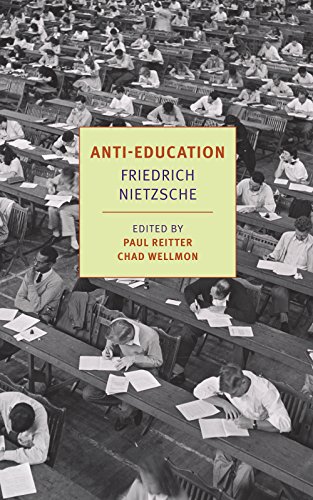 Reddit reviews Anti-Education: On the Future of Our Educational Institutions (New York Review Books Classics)
Reddit reviews Anti-Education: On the Future of Our Educational Institutions (New York Review Books Classics)
We found 1 Reddit comments about Anti-Education: On the Future of Our Educational Institutions (New York Review Books Classics). Here are the top ones, ranked by their Reddit score.

New York Review of Books
In his lectures titled "On the Future of our Education Institutions" that he delivered in 1872 at the age of 24, Nietzsche certainly expressed an intellectual elitism. Echoed in the passage from Twilight of the Idols that is quoted on the blog. Here are a few quotations taken from the recent translation of these lectures titled Anti-Education. Link: https://www.amazon.com/gp/product/1590178947/ref=oh_aui_detailpage_o01_s00?ie=UTF8&psc=1
"You always said that no one would strive for education if they knew how unbelievably small the number of truly educated people actually was, or ever could be. But that it was impossible to achieve even this small quota of truly educated people unless a great mass of people were tricked, seduced, into going against their nature and pursuing an education. As a result we must never publicly betray the ridiculous disproportion between the number of truly educated people and the size of our monstrously overgrown educational system" (p. 14).
"No, we must proclaim with one voice that people truly destined by nature for an educational path are infinitely few and far between, and that far fewer institutions of higher education than we have today would be enough to let these rare people develop successfully. In today's educational institutions, intended for the masses, precisely the people for whom such institutions should exist are the ones who receive the least support" (p. 40).
Nietzsche later critiques the current trend in education that he sees: "These heralds proclaiming the needs of culture, seen from up close, appear suddenly transformed into eager, even fanatical enemies of true culture--one that holds firm to the aristocratic nature of the spirit. Their fundamental goal is the emancipation of the masses from the rule of the great individuals. What they are working towards is the overthrow of the sacred order in the empire of the intellect: the servitude, the submissive obedience, and instinctive loyalty of the masses to the scepter of genius...But the sacred natural order will never grant it to them: They are born to serve, to obey...Education for the masses cannot be our goal--only the cultivation of the chosen individual, equipped to produce great and lasting works." (p. 41).
I must point out that Nietzsche presents these opinions in the mouths of men having a conversation he overheard. However, it is quite clear that Nietzsche invented much, if not all, of what he has written. For the young Nietzsche, it seems quite clear that man as a species is by nature hierarchical. Now, perhaps he means this purely intellectually and apolitically. I believe the claim that Nietzsche was "apolitical," however, to be quite absurd.
An older Nietzsche, at the final "phase" of his philosophy, writes in Beyond Good and Evil in the first section of the chapter titled "What is Noble?": "Every elevation of the type 'man' has hitherto been the work of an aristocratic society--and so it will always be" (section 257). The entire section is relevant. If Nietzsche were truly apolitical, as the author claims, he would not have written his thoughts down. Nietzsche certainly belongs in the history of political philosophy.
Nietzsche despised democracy. He despised socialism. He despised Christianity because it was the precursor to modern democracies! He attacks Plato for being the precursor to Christianity! His entire philosophic thought is essentially centered around the natural inequalities between men. In part I of TSZ, Zarathustra does not tell his disciples to become supermen. He tells them to pave the way for the superman. There is a reason superman is only used in the plural form once.
But perhaps I'm mistaken. Perhaps this man (who criticized Christianity for being too weak and effeminate, who repeatedly called for an "order of rank" in society, who said that the man he despised most was the "socialist rabble") was actually a proponent of democracy.
Or would it not be irresponsible, and contradictory, for Nietzsche to be a defender of democracy since he did not believe that mass education was possible?
On an unrelated note, how could the author of the blog quote John Rawls in a discussion of Nietzsche (unless to compare Rawls to Nietzsche's last man)? I have absolutely zero doubt that Nietzsche would despise Rawls' "A Theory of Justice."